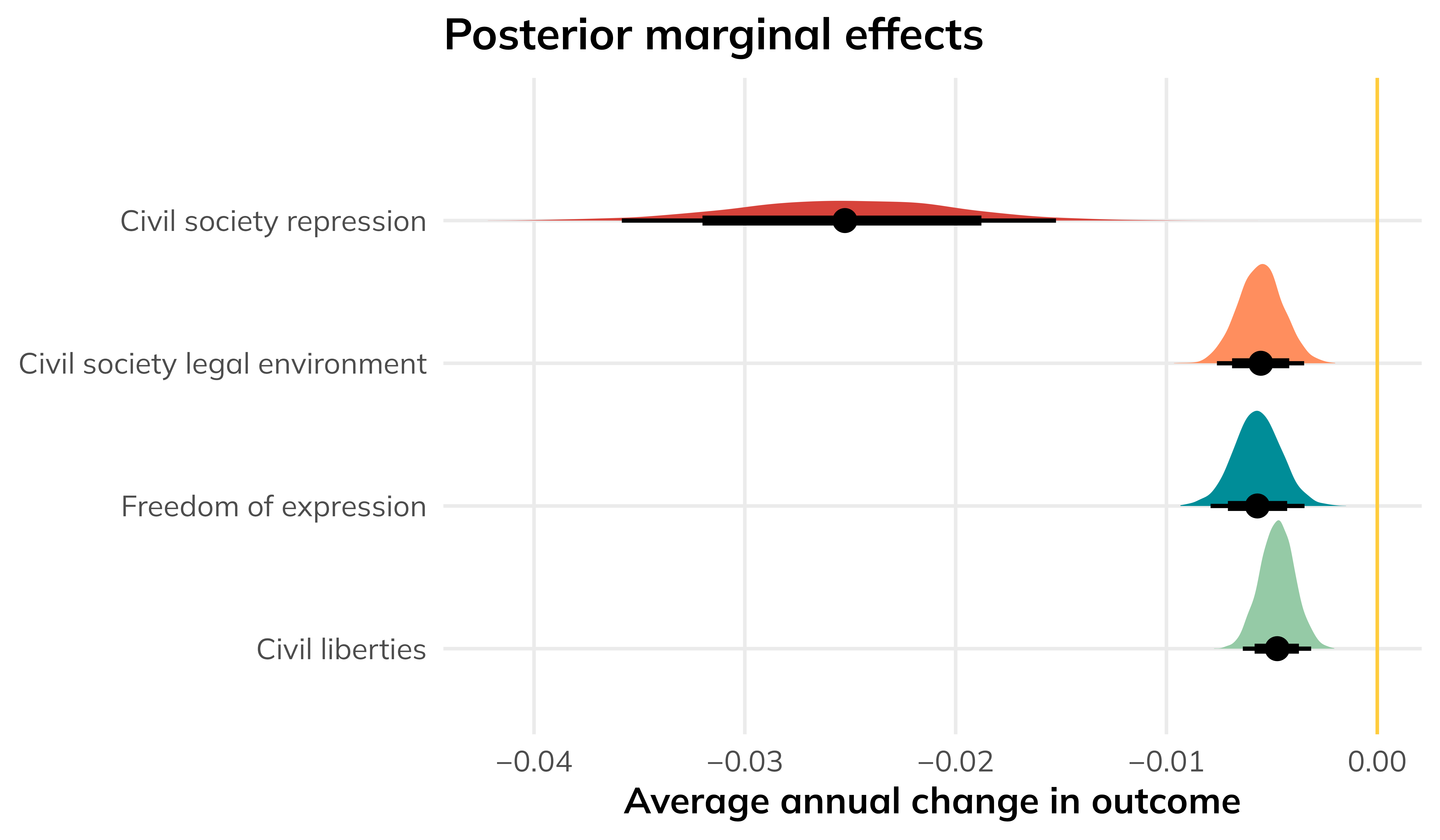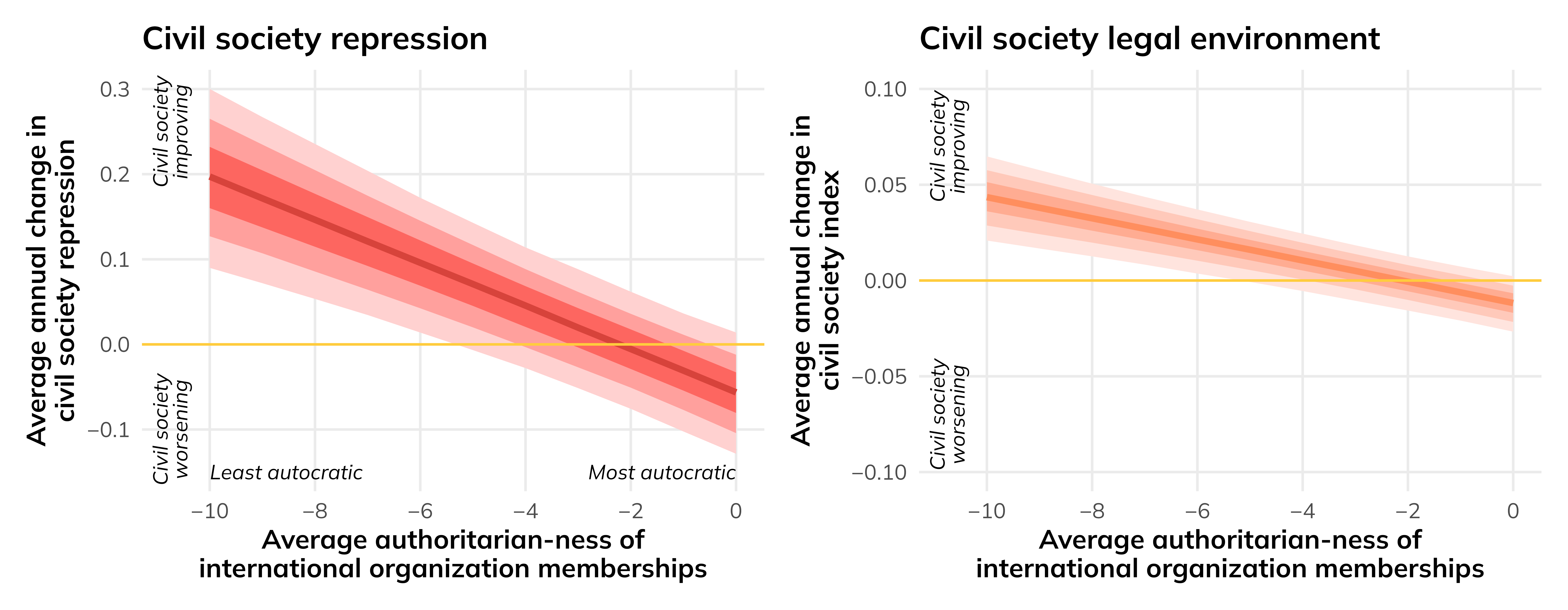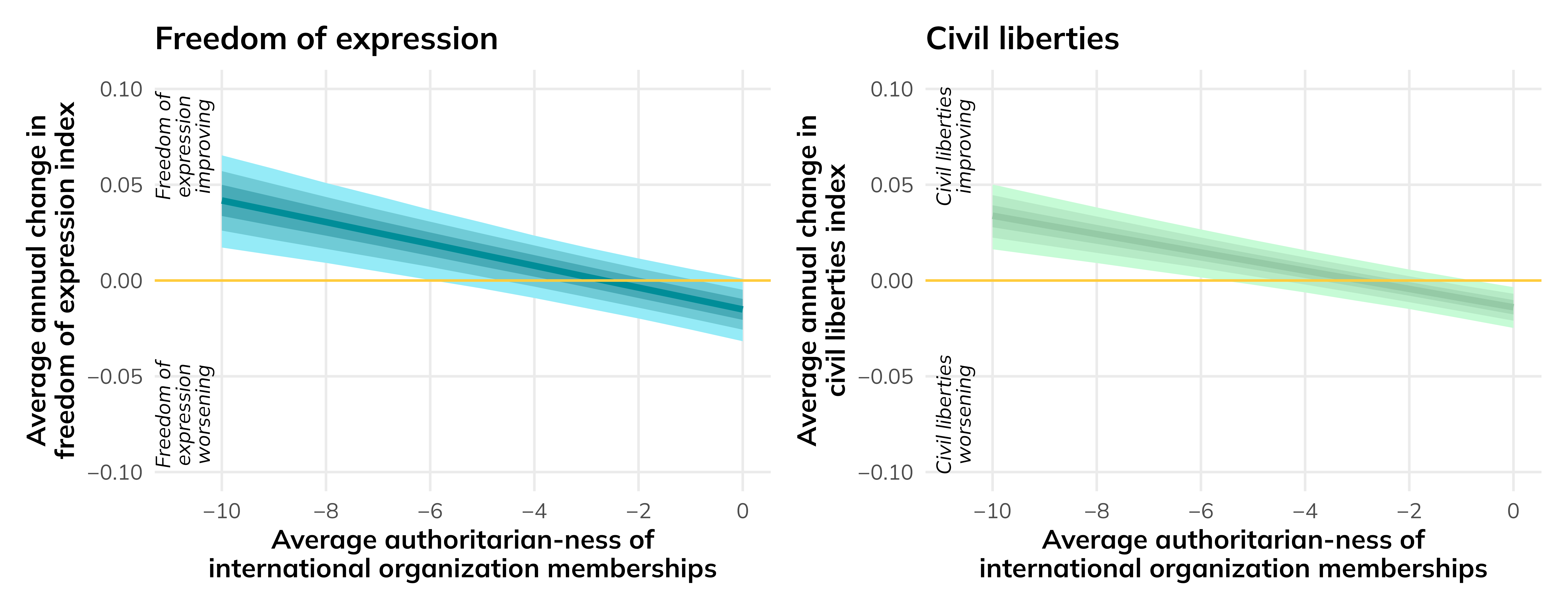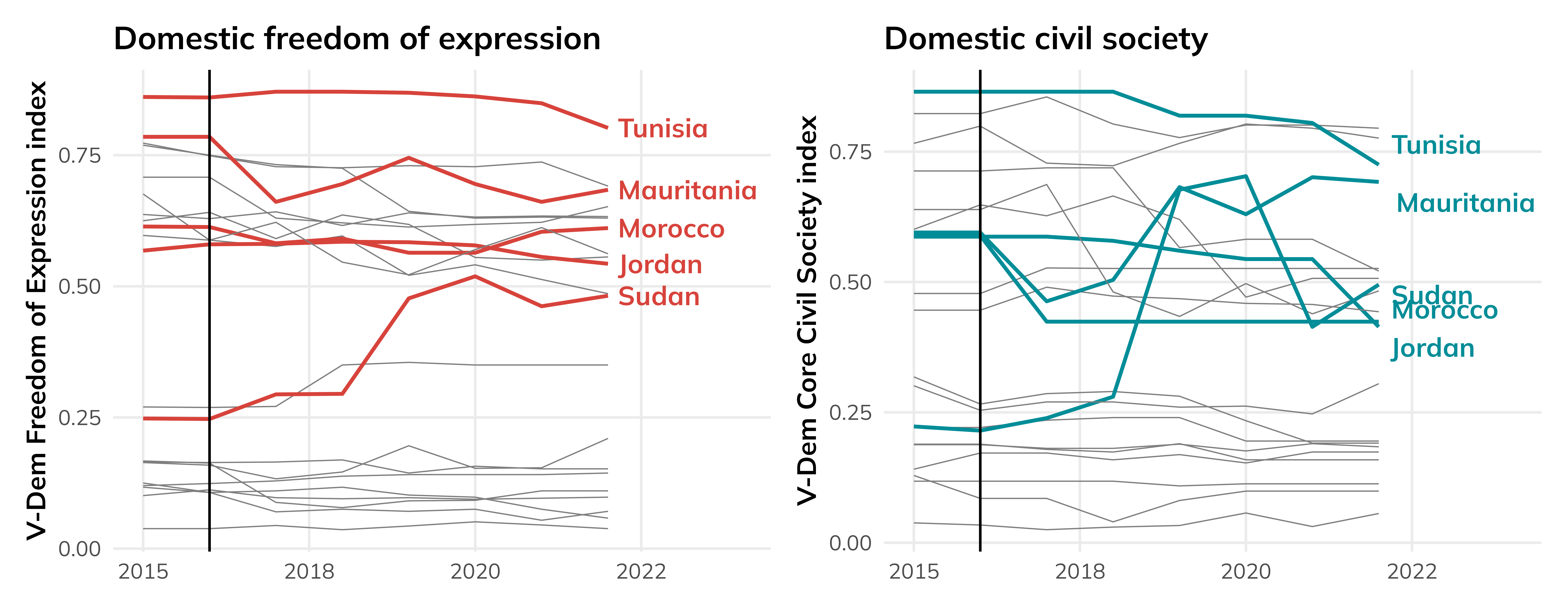Introduction
Phew. This paper is very much a draft and a work in progress and (somewhat embarassingly) incomplete. But it should provide a solid overview of my overarching theory and some early attempts at testing and exploring that theory. I look forward to comments from everyone!
Authoritarian institutional balancing and international organizations
A rich literature in comparative politics explores how authoritarian regimes counterintuitively use democratic institutions for their own benefit and survival (Kendall-Taylor and Frantz 2014; Gandhi and Przeworski 2006, 2007). Authoritarian states hold elections (Levitsky and Way 2010) and allow international monitors to observe the process (Kelley 2012), devolve power to independent judiciaries (Ginsburg and Moustafa 2008), allow opposition parties in the legislature and set executive term limits (Meng 2020). They also permit the growth of domestic civil society and allow international NGOs to operate and often advocate for human rights reforms (Heiss 2019a, 2019b, 2017; Ye and Heiss 2023). Each of these democratic-appearing forms of institutionalization, however, are designed to keep the ruling party in power—institutions are kept weak and “dependent on the regime to ensure that they do not develop any real power or autonomy” (Frantz and Ezrow 2011, 7).
Authoritarian regimes also take this off-label approach to their participation in international and regional organizations. For instance, repressive governments have increasingly become involved in multilateral organizations focused on human rights, environmental policies, good governance, and other contentious issues that often conflict with domestic policy goals. At a naive first glance, a dictatorship’s participation in a human rights organization like the United Nations Human Rights Council (UNHRC) might appear like an embrace of reforms that might lead to improved domestic human rights. However, a growing body of work demonstrates that authoritarian states use international organizations as yet another strategy to shore up domestic stability and maintain regime longevity (Cottiero 2021; Cottiero and Haggard 2023; Debre 2021, 2022; Obydenkova and Libman 2019). As more authoritarian states join international and regional organizations, they can reshape these organizations’ agendas in their favor, pushing these IOs to refocus attention toward or away from different domestic human rights abuses in ways that help legitimate authoritarian rule (Cottiero and Haggard 2023).
For instance, Hafner-Burton, Pevehouse, and Schneider (2023) illustrate how corrupt autocratic states make international commitments to good governance reforms, but only within international organizations that have primarily authoritarian member states. These commitments, like the African Union’s Convention on Preventing and Combating Corruption, are used “strategically to promote an autocratic agenda” (Hafner-Burton, Pevehouse, and Schneider 2023, 26) both internationally and domestically. Since the commitments are made on an international stage, they have a type of global seal of approval and provide reputational benefit for states. However, since the commitments are designed by largely authoritarian member states, these agreements are often filled with loopholes and mechanisms for avoiding enforcement. States can thus “uptake good governance talk but lessen any deep commitment to the norms” (Hafner-Burton, Pevehouse, and Schneider 2023, 1).
More broadly, China and Russia have been at the forefront of the Like-Minded Group (LMG), a cohort of authoritarian UN member states that has strategically engaged with the UNHRC, the World Health Organization, Interpol, the Organization for Security and Cooperation in Europe (OSCE), and other human rights-focused regional and international organizations to reshape and constrain the international human rights system (Inboden 2023). LMG states have chipped away at longstanding human rights norms and have proposed parallel forms of human rights regimes that they can control. Authoritarian states can thus engage with the international system to improve stability at home and simultaneously reorganize it in a way that makes these institutions align more closely to their policy preferences.
States are not the only actors that work within regional and international organizations—NGOs also play an important role in international policymaking, often holding consultative or voting roles in IOs. Even in cases where NGOs do not have direct voting rights in IOs, NGOs can wield power indirectly. For example, NGOs that receive official recognition consultative status in the United Nations Economic and Social Council (ECOSOC) can submit Universal Period Review (UPR) reports as part of the UN’s official process for overseeing the human rights records of member nations. NGO representatives attend IO meetings, issue reports, and lobby IO officials for policy changes. More broadly, through their advocacy work, NGOs can reshape global human rights agendas (Kapstein and Busby 2013; Carpenter 2014; Wong 2012).
Authoritarian states engage with these IO-affiliated NGOs as part of their larger strategy of interaction with the international system for domestic benefit. For instance, Kelley (2012) argues that because election monitoring has become a global norm, governments—even those who fully intend on cheating and manipulating the election—permit and partner with election monitoring NGOs as a way of appearing credible and democratic to peer nations. To ensure that monitoring efforts do indeed improve the regime’s reputation, authoritarian governments will try to circumvent international monitors or purposely invite friendly (or bribable) monitors to counterbalance more objective organizations. Because of this, election monitors can ultimately “contribute to the false legitimization of governments” (Kelley 2012, 155). These “zombie” election monitoring NGOs often partner with larger regional or international organizations like the African Union or Arab League, which lends further credence to their legitimacy (Bush and Prather 2018; Debre and Morgenbesser 2017). Authoritarian states thus leverage international organizations and NGOs to remain in power at home.
The authoritarian embrace of NGOs at a global level conflicts with domestic trends in civil society regulations. Over the past decade, there has been an ongoing closing of civic space, or global crackdown on civil society (Christensen and Weinstein 2013; Chaudhry 2022; Chaudhry and Heiss 2018, 2022; Dupuy, Ron, and Prakash 2015, 2016; Bakke, Mitchell, and Smidt 2020; Fransen et al. 2021). Since 2013, more than 100 states have passed laws that restrict, repress, or shut down civil society (ICNL 2021), and only 21% of countries had open and unrestricted civic space by 2021 (Chaudhry and Heiss 2022; CIVICUS 2023). Authoritarian states increasingly curtail associational rights and shut down NGOs that might pose a threat to their power. However, as with other democratic-appearing institutions, authoritarians limit and engage with civil society in strategic ways (Heiss 2017; DeMattee 2019). States will often be more lenient, open, and permissive with NGOs that fit with their policy preferences—such as organizations focused on humanitarian services and disaster relief—while imposing harsher restrictions on NGOs working on more contentious issues like human rights advocacy (Ye and Heiss 2023; Heiss 2017).
Theoretical framework
The simultaneous embrace of global civil society and rejection of domestic civil society by authoritarian states creates a unique dynamic in international relations and comparative politics research. To help explore this relationship, I propose a framework for understanding the interplay between autocrats, international organizations, global civil society, and domestic civil society (see Figure 1).
In this model, authoritarian states engage with their internal domestic institutions such as legislatures, judiciaries, civil society, and other democratic-appearing institutions in ways that are selective and typically adversarial. Following the literature on competitive authoritarianism discussed previously, domestic institutions are rivals and threats to regime power and must be offset in ways that delegate a modicum of authority while maintaining regime stability. The state uses these not-quite-democratic institutions to form laws and policies that insulate it from additional regime instability.
Conversely, authoritarian states engage with international organizations—particularly IOs that have an authoritarian nature already—in a more positive manner. In their special consultative role in regional and international organizations, INGOs become a possible target for cooperation or co-optation as well. When working internationally, authoritarian states can target IOs directly (as in the case of China, Russia, and the LMG and their efforts to reshape the international human right system by changing formal organization rules or establishing parallel agencies) or they can target the consultative international NGOs (as in the case of “zombie” election monitoring organizations). States work to ensure that policy recommendations from the international arena—from work either with IOs or INGOs—are beneficial to the ruling regime.
In this paper, I test elements of this framework by exploring two questions related to authoritarian stability, civil society, and international organizations: (1) how does membership in authoritarian IOs shape states’ domestic civil society regulations, and (2) how do states use NGOs in authoritarian IOs to protect and enhance regime stability. I propose that NGOs and international civil society more broadly are another strategy in authoritarian stability-seeking calculus. Authoritarian state interactions with IOs and international NGOs shape their approach to domestic policies. Cottiero and Haggard (2023) demonstrate that increased involvement in authoritarian-dominated IOs leads to reduced democratic institutionalization at home. I argue that a similar mechanism shapes more specific policies, particularly states’ approaches to regulating and repressing domestic civil society. Many of the issues addressed by IOs and INGOs relate to human rights, anti-corruption, good governance, and other more contentious issues that are typically taken up by advocacy organizations. If authoritarian states distort these policies, though, as they do with domestic institutions, we would expect to see a worsening of the general civil society and human rights legal environment as states engage with more authoritarian IOs.
I examine these questions with cross-national quantitative data from the Varieties of Democracy project and two qualitative case studies of authoritarian states, authoritarian IOs, and international NGOs working together.
Domestic civil society repression and authoritarian international organizations
I’ve got all sorts of stats-y detail to include here, like the identification strategy, modeling strategy, covariates and confounders included, Bayesian modeling details, and so on, but that’s all unfinished for now.
Instead, I’ll show the main results, because those are interesting. I’m more than happy to discuss the technical details later though!
The general idea here is that more involvement with authoritarian IOs leads to worse civil society at home, measured as civil society repression, the general civil society environment, media freedom, and general human rights.
- Data: V-Dem, all authoritarian countries from 1950–2010
- Outcome variables: civil society repression (
v2csreprss), civil society environment (v2xcs_ccsi), freedom of expression index (v2x_freexp_altinf), civil liberties index (v2x_civlib); all leaded one year + separated into annual changes in values instead of complete value
- Key treatment variable: average polyarchy score of all international organization memberships (via Cottiero and Haggard (2023))
- Control variables / confounders: log GDP per capita, percent change in GDP, outcome variable in previous year, polyarchy, elected official index, direct popular vote index, equal protection index, political corruption index, physical violence index, count of IO memberships with China, count of IO memberships with Russia, indicator for whether the country faces violent conflict, indicator for whether the year is 1989 or earlier
- Modeling strategy: multilevel Bayesian model with random country intercepts, random year slopes, and a linear year trend (i.e.
y ~ x + ... + year + (1 + year | country))
Strategic engagement with international civil society within authoritarian international organizations
While data sources like V-Dem provide rich quantitative indicators related to democratization and civil society at a domestic level within states, and while the groundbreaking work of Cottiero and Haggard (2023) provides early measures of the authoritarian nature of international and regional organizations, there is far less data about NGO involvement in these IOs. Moreover, state interactions with NGOs and IOs is far less documented and largely unobservable, making it difficult to explore at a large scale. Instead, careful qualitative and investigative work is required to uncover the connections between states, NGOs, and IOs.
To explore the second mechanism of my theoretical framework—how authoritarian states bolster their domestic stability by turning to NGOs that work with international or regional organizations—I look at two representative case studies. In each case, authoritarian states that restrict civil society domestically engaged positively with well-connected and well-respected international NGOs through selective partnerships with regional organizations. States used their work with NGOs within these regional organizations to push for democratic-appearing policy reforms, which subsequently opened additional avenues for increased domestic repression of civil society.
IFJ and the Arab League
Founded in 1926, the International Federation of Journalists (IFJ) is perhaps the largest and oldest NGO focused on media freedom and journalist protection. Unlike other prominent media rights NGOs like Article 19, Index on Censorship, and International PEN, which pattern themselves after human rights organizations like Amnesty International and address specific violations of freedom of expression and censorship, IFJ positions itself as the “global voice of journalists” and partners with journalistic trade unions in 140 different countries. As a result, it claims to represent 600,000 journalists worldwide (IFJ 2023).
IFJ is affiliated with the United Nations system and other international and regional organizations. Since 1953, it has maintained ECOSOC consultative status, which has allowed it to lobby for policy changes within the UN system. Both on its own and through partnerships with other media-focused INGOs, IFJ regularly submits Universal Periodic Review (UPR) reports to call out states that repress freedom of expression and violate other human rights. TODO: Count of IFJ-sponsored UPR reports?
In October 2014, following the tumultuous Arab uprisings, IFJ spearheaded a conference in Casablanca, Morocco, with the intention of drafting a blueprint for strengthening protections for freedom of expression in the region (IFJ 2014). With the support of the Moroccan government and other Arab League member nations, IFJ partnered with the Federation of Arab Journalists (FAJ), an umbrella organization representing journalists within the Arab League (and that has often collaborated with repressive regimes; see Ahram Online (2023) for an example). Following the conference, IFJ and FAJ worked together to draft a declaration of media freedom for the Arab world that included a set of core principles of journalistic and media rights, as well as a proposal for a legal mechanism to address violations of those rights using formal institutions within the Arab League.
Surprisingly, however, there was substantial opposition to the draft declaration from media freedom advocates. 28 prominent freedom of expression advocacy NGOs from across the region—including the Cairo Institute for Human Right Studies, the Egypt-based Arabic Network for Human Rights Information in Egypt, the Moroccan Association for Investigative Journalism, the Moroccan Association for Human Rights, the Tunisian Human Rights League, the Gulf Center for Human Rights, among others—as well as IFEX, an international coalition of media-focused advocacy NGOs, publicly opposed the declaration and called for substantial changes to its proposed policies (CIHRS 2016; SMEX and IFEX 2016). The key issue driving the opposition was that the declaration gave final enforcement authority to the Arab League and its member states, which they argued would only meet regime needs. The opposing NGOs argued that “assigning this [enforcement] mechanism within the Arab League would mean that it will be controlled and directed by Arab governments to serve their policies, often characterized by repression and persecution,” and that, accordingly, expression rights would not be protected (SMEX and IFEX 2016).
Despite these concerns, the Declaration on Media Freedom in the Arab World was formally adopted in May 2016 in Casablanca (IFJ 2018). In the subsequent months, several Arab states—many of which were indirectly involved in the drafting of the Declaration—signed and adopted the principles. For instance, in May 2017, IFJ hosted a signing ceremony in Morocco with members of civil society—representatives from the country’s national human rights council (Conseil national des droits de l’homme), and the country’s national press syndicate (Syndicat national de la presse marocaine)—as well as key members of the Moroccan parliament, including leadership from nearly all political parties (IFJ 2017). Reforms initiated by global civil society, in conjunction with the Arab League, were thus adopted as domestic policy priorities in an authoritarian state.
The principles and mechanisms in the Declaration—crafted by INGOs like IFJ and FAJ with the support of the Arab League—ostensibly limit Arab states’ ability to repress media freedom domestically by providing protections for journalists and creating formal legal mechanisms for enforcing those rights. These states willingly signed the Declaration to arguably constrain themselves against future repression (see Meng 2020). But they did so in a way that actually has not imposed any actual constraints. With the exception of Sudan, press freedom has remained stagnant or has declined in the Arab League states that have officially signed the Declaration (Palestine, Tunisia, Jordan, Sudan, Morocco and Mauritania), and these trends align with non-signatory states, and general civil society openness has decreased in most states as well. (see Figure 5). The special reporting and enforcement mechanism has not been used, and IFJ continues to call on Arab League states to join the declaration and respect its guidelines (IFJ 2019). Signatory states appear to have benefited from the positive press both internationally and domestically and were able to rely on the Arab League to defang the enforcement mechanism and bring it under their (indirect) control.
Sportswashing in the GCC through FIFA and the IOC
Similar story that illustrates the same mechanisms with sportswashing with FIFA + the GCC + individual Gulf states during the 2022 Qatar World Cup
Conclusion
Future research - there are multiple pathways; why go through the effort of working through an AIO and its NGOs instead of just working domestically? What determines when a regime will go internationally instead of domestically?
References
Ahram Online. 2023.
“Sisi Affirms Egypt’s Full Support of the Federation of Arab Journalists’ Role.” Ahram Online. February 5, 2023.
https://english.ahram.org.eg/NewsContent/1/2/487574/Egypt/Society/Sisi-affirms-Egypt%E2%80%99s-full-support-of-the-Federatio.aspx.
Bakke, Kristin M., Neil J. Mitchell, and Hannah M. Smidt. 2020.
“When States Crack down on Human Rights Defenders.” International Studies Quarterly 64 (1): 85–96.
https://doi.org/10.1093/isq/sqz088.
Bush, Sarah Sunn, and Lauren Prather. 2018.
“Who’s There? Election Observer Identity and the Local Credibility of Elections.” International Organization 72 (3): 659–92.
https://doi.org/10.1017/S0020818318000140.
Carpenter, R. Charli. 2014.
“Lost Causes": Agenda Vetting in Global Issue Networks and the Shaping of Human Security. Ithaca: Cornell University Press.
https://doi.org/10.7591/9780801470363.
Chaudhry, Suparna. 2022.
“The Assault on Civil Society: Explaining State Crackdown on NGOs.” International Organization 76 (3): 549–90.
https://doi.org/10.1017/S0020818321000473.
Chaudhry, Suparna, and Andrew Heiss. 2018. “Charity During Crackdown: Analyzing the Impact of State Repression of NGOs on Philanthropy.”
———. 2022. “Closing Space and the Restructuring of Global Activism Causes and Consequences of the Global Crackdown on NGOs.” In Beyond the Boomerang: From Transnational Advocacy Networks to Transcalar Advocacy in International Politics, edited by Christopher L. Pallas and Elizabeth A. Bloodgood, 23–35. Tuscaloosa, Alabama: University of Alabama Press.
Christensen, Darin, and Jeremy M. Weinstein. 2013.
“Defunding Dissent: Restrictions on Aid to NGOs.” Journal of Democracy 24 (2): 77–91.
https://doi.org/10.1353/jod.2013.0026.
CIHRS. 2016.
“Arab NGOs Warn Against ‘Regional Media Freedom Mechanism’ Project Under the Umbrella of the Arab League of States.” Cairo Institute for Human Rights Studies. April 28, 2016.
https://cihrs.org/arab-ngos-warn-against-regional-media-freedom-mechanism-project-under-the-umbrella-of-the-arab-league-of-states/?lang=en.
CIVICUS. 2023.
“CIVICUS Monitor.” 2023.
https://monitor.civicus.org/.
Cottiero, Christina. 2021.
“Staying Alive: Regional Integration Organizations and Vulnerable Leaders.” PhD dissertation, San Diego, California: University of California San Diego.
https://escholarship.org/uc/item/93w3s0z6.
Cottiero, Christina, and Stephan Haggard. 2023.
“Stabilizing Authoritarian Rule: The Role of International Organizations.” International Studies Quarterly 67 (2): 1–15.
https://doi.org/10.1093/isq/sqad031.
Debre, Maria J. 2021.
“The Dark Side of Regionalism: How Regional Organizations Help Authoritarian Regimes to Boost Survival.” Democratization 28 (2): 394–413.
https://doi.org/10.1080/13510347.2020.1823970.
———. 2022.
“Clubs of Autocrats: Regional Organizations and Authoritarian Survival.” The Review of International Organizations 17 (3): 485–511.
https://doi.org/10.1007/s11558-021-09428-y.
Debre, Maria J., and Lee Morgenbesser. 2017.
“Out of the Shadows: Autocratic Regimes, Election Observation and Legitimation.” Contemporary Politics 23 (3): 328–47.
https://doi.org/10.1080/13569775.2017.1304318.
DeMattee, Anthony J. 2019.
“Covenants, Constitutions, and Distinct Law Types: Investigating Governments’ Restrictions on CSOs Using an Institutional Approach.” Voluntas: International Journal of Voluntary and Nonprofit Organizations 30 (6): 1229–55.
https://doi.org/10.1007/s11266-019-00151-2.
Dupuy, Kendra E., James Ron, and Aseem Prakash. 2015.
“Who Survived? Ethiopia’s Regulatory Crackdown on Foreign-Funded NGOs.” Review of International Political Economy 22 (2): 419–56.
https://doi.org/10.1080/09692290.2014.903854.
———. 2016.
“Hands Off My Regime! Governments’ Restrictions on Foreign Aid to Non-Governmental Organizations in Poor and Middle-Income Countries.” World Development 84 (August): 299–311.
https://doi.org/10.1016/j.worlddev.2016.02.001.
Fransen, Luc, Kendra Dupuy, Marja Hinfelaar, and Sultan Mohammed Zakaria Mazumder. 2021.
“Tempering Transnational Advocacy? The Effect of Repression and Regulatory Restriction on Transnational NGO Collaborations.” Global Policy 12 (S5): 11–22.
https://doi.org/10.1111/1758-5899.12972.
Frantz, Erica, and Natasha Ezrow. 2011.
The Politics of Dictatorship: Institutions and Outcomes in Authoritarian Regimes. Boulder, Colorado: Lynne Rienner Publishers.
https://doi.org/10.1515/9781685854324.
Gandhi, Jennifer, and Adam Przeworski. 2006.
“Cooperation, Cooptation, and Rebellion Under Dictatorships.” Economics & Politics 18 (1): 1–26.
https://doi.org/10.1111/j.1468-0343.2006.00160.x.
———. 2007.
“Authoritarian Institutions and the Survival of Autocrats.” Comparative Political Studies 40 (11): 1279–1301.
https://doi.org/10.1177/0010414007305817.
Ginsburg, Tom, and Tamir Moustafa. 2008.
Rule by Law: The Politics of Courts in Authoritarian Regimes. Cambridge, UK: Cambridge University Press.
https://doi.org/10.1017/cbo9780511814822.
Hafner-Burton, Emilie M., Jon C. W. Pevehouse, and Christina J. Schneider. 2023.
“Enlightened Dictators? Good Governance in Autocratic International Organizations.” Working paper. La Jolla, California: UC Institute on Global Conflict and Cooperation.
https://ucigcc.org/publication/enlightened-dictators-good-governance-in-autocratic-international-organizations/.
Heiss, Andrew. 2017. “Amicable Contempt: The Strategic Balance Between Dictators and International NGOs.” Durham, NC: Duke University.
———. 2019a.
“NGOs and Authoritarianism.” In
Routledge Handbook of NGOs and International Relations, edited by Thomas Davies, 557–72. London: Routledge.
https://doi.org/10.4324/9781315268927-39.
———. 2019b.
“Taking Control of Regulations: How International Advocacy NGOs Shape the Regulatory Environments of Their Target Countries.” Interest Groups and Advocacy 8 (3): 356–75.
https://doi.org/10.1057/s41309-019-00061-0.
ICNL. 2021.
“The Civic Space Initiative.” International Center for Not-For-Profit Law. 2021.
https://www.icnl.org/our-work/global-programs/the-civic-space-initiative.
IFJ. 2014.
“Beyond the Arab Spring: New Road Map for Journalists.” International Federation of Journalists. August 26, 2014.
https://www.ifj.org/media-centre/news/detail/article/beyond-the-arab-spring-new-road-map-for-journalists.
———. 2018.
“Explanatory Memorandum: Declaration on Media Freedom in the Arab World.” International Federation of Journalists. October 2, 2018.
https://www.ifj.org/media-centre/reports/detail/explanatory-memorandum-declaration-on-media-freedom-in-the-arab-world/category/human-rights.
———. 2019.
“Arab World: Journalists’ Unions Say It Is Time for Arab States’ Leaders to Support Media Freedom and Independence.” International Federation of Journalists. April 1, 2019.
https://www.ifj.org/media-centre/news/detail/article/arab-world-journalists-unions-say-it-is-time-for-arab-states-leaders-to-support-media-freedom-and.
———. 2023.
“The Global Voice of Journalists.” International Federation of Journalists. 2023.
https://www.ifj.org/who/about-ifj.
Inboden, Rana Siu. 2023.
“Defending the Global Human Rights System from Authoritarian Assault: How Democracies Can Retake the Initiative.” IGCC Report. La Jolla, California: UC Institute on Global Conflict and Cooperation.
https://ucigcc.org/publication/defending-the-global-human-rights-system-from-authoritarian-assault/.
Kapstein, Ethan B., and Joshua W. Busby. 2013. AIDS Drugs for All: Social Movements and Market Transformations. New York: Cambridge University Press.
Kelley, Judith G. 2012.
Monitoring Democracy: When International Election Observation Works, and Why It Often Fails. Princeton: Princeton University Press.
https://doi.org/10.1515/9781400842520.
Kendall-Taylor, Andrea, and Erica Frantz. 2014.
“Mimicking Democracy to Prolong Autocracies.” The Washington Quarterly 37 (4): 71–84.
https://doi.org/10.1080/0163660x.2014.1002155.
Levitsky, Steven, and Lucan A. Way. 2010.
Competitive Authoritarianism: Hybrid Regimes After the Cold War. Cambridge, MA: Cambridge University Press.
https://doi.org/10.1017/cbo9780511781353.
Meng, Anne. 2020.
Constraining Dictatorship: From Personalized Rule to Institutionalized Regimes. 1st ed. Cambridge, UK: Cambridge University Press.
https://doi.org/10.1017/9781108877497.
Obydenkova, Anastassia V., and Alexander Libman. 2019.
Authoritarian Regionalism in the World of International Organizations: Global Perspective and the Eurasian Enigma. Oxford University Press.
https://doi.org/10.1093/oso/9780198839040.001.0001.
SMEX, and IFEX. 2016.
“Media Freedom Mechanism in the Arab Region Requires Consultation and Independence.” Social Media Exchange (SMEX) and IFEX. April 13, 2016.
https://smex.org/media-freedom-mechanism-in-the-arab-region-requires-consultation-and-independence/.
Wong, Wendy H. 2012.
Internal Affairs: How the Structure of NGOs Transforms Human Rights. Ithaca: Cornell University Press.
https://doi.org/10.7591/9780801466069.
Ye, Meng, and Andrew Heiss. 2023. “The Implementation of China’s Overseas NGO Law and the Operating Space for International Civil Society.” Working paper.





